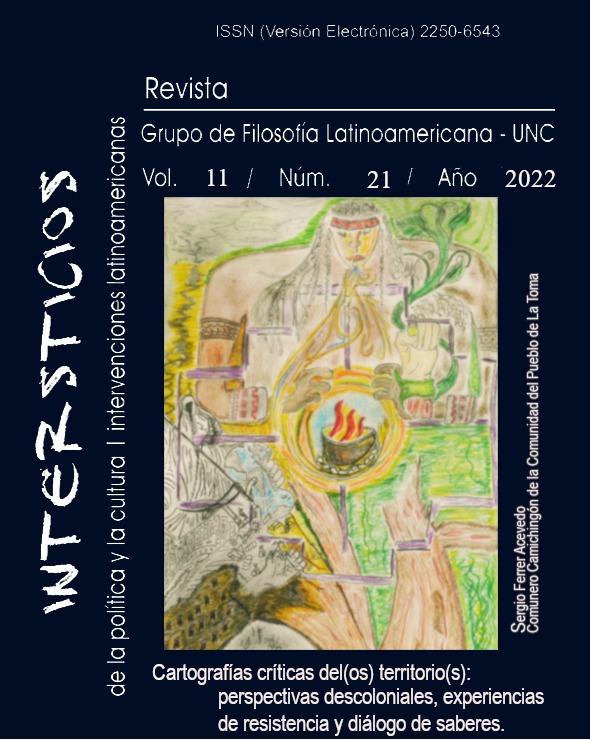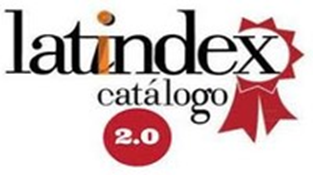Territory and women of native peoples: A view from the Mapuche - Williche women of the Aliwen community (present-day Chile)
Keywords:
territory, worldview , mapuche women – WillicheAbstract
From a historical perspective, Mapuche territorial and autonomy claims have begun to emerge in the Ngulu and Puel Mapu (present-day Chile and Argentina) in the late 1990s. Since then, the Mapuche people have made themselves visible as a homogeneous group before Chilean and international society. In this context, the community with Williche identity and their experiences in the reductional and colonization processes of the territories under their domain, have been made invisible to non-Mapuche society. In this context, the research focuses on analyzing the territorialities of Mapuche - Williche women in the process of building the Wallmapu, based on work and study with women from the Aliwen community, in the Los Muermos commune, Los Lagos Region, current Chile. Thus, this research has political and academic relevance. From the political point of view, it seeks to make visible the construction of the Mapuche territory, from the perspective of the women of the community, since it becomes necessary to call attention to and analyze the contribution of the Mapuche - Williche women in the process of building the territory. Mapuche territory, from its practices. From an academic perspective, the works carried out from the social sciences have traditionally related the territory with ethnic identity, without taking into account that gender differences not only cross ethnicity, but also condition the way in which territories are constructed. Finally, this research seeks to contribute to the debate and reflection from the other subjects, as builders of realities, knowledge and epistemologies, from a daily practice marked by the worldview that builds the Mapuche - Williche territory.
Downloads
References
Bello, A. (2014). Cordillera, naturaleza y territorialidades simbólicas entre los mapuche del Siglo XIX. Scripta Philosophiæ Naturalis 6. pp 21–33.
Calvillo Velasco, M. (2012). Territorialidad del género y generidad del territorio. En Explorando territorios: una visión desde las ciencias sociales, México DF: UAM-X, CSH.
De Souza Santos, B. (2011). Introducción a las Epistemologías del Sur: Portugal. Disponible en: http://www.boaventuradesousasantos.pt/media/INTRODUCCION_BSS.pdf
Escobar, A. (2015). Sentipensar con la Tierra: Las Luchas Territoriales y la Dimensión Ontológica de las Epistemologías. Universidad de Carolina del Norte en Chapel Hill y Universidad del Valle, Cali. Revista de Antropología Iberoamericana. PP 11 – 32.
Grebe, M. E., Pacheco, S. y Segura, J. (1972). Cosmovisión mapuche. Cuadernos de la realidad nacional, N° 14: 46-73.
Haesbaert da Costa, R. (2011). El mito de la desterritorialización. Del “fin de los territorios” a la multiterritorialidad. México. Siglo XXI, Editores.
Llanca Marín. (2005). La matria mapuche. Publicado en Azkintuwe Noticias. Recuperado en http://www.mujeresenred.net/spip.php?article1359
Marileo Lefío, A. (2017). Mundo Ancestral y Sistema Medico Mapuche. Centro de Estudios del Mundo Mapuche, “WallmeKintun”. Temuko, Chile.
Marimán, P; Caniuqueo, S; Millalén, J; Levil, R. (2006). ¡...Escucha, wingka...! Cuatro ensayos de Historia Nacional Mapuche y un epílogo sobre el futuro. Santiago, Chile. LOM Ediciones.
Martínez Berríos, N. (2015). “Tierra, territorio y territorialidad mapuche: Producción de espacio y formación de subjetividades”. Geo Sur 3(1). pp 37-62.
Melin, M; Mansilla, P; Royo, M. (2017). Mapu Chillkantukun Zugu: Descolonizando el Mapa del Wallmapu, Construyendo Cartografía Cultural en Territorio Mapuche. 1ª Edición. Temuco: Pu Lof Editories ltda. Chile.
Molina Otárola, R. (1995). Reconstrucción de los etno-territorios, en José Aylwin, Hugo Carrasco y Christian Martínez (ed.), Tierra, Territorio y Derecho Indígena. IEI-UFRO, Temuco. pp. 111-118.
Nates Cruz, B. Soportes teóricos y etnográficos sobre conceptos de territorio. Revista Co-herencia Vol 8, Nº 14, Enero - Junio 2011. Medellín, Colombia. pág. 209-227.
Painemal, M, Richards, P. (octubre, 2006). Transnacionalización, Derechos Humanos, y Mujeres Mapuche. Ponencia presentada en el V Congreso de la Red Latinoamericana de Antropología Jurídica (RELAJU). Oaxtepec, México.
Quilaqueo Rapiman, F. (octubre, 2012). Mujer, Pueblo y Cultura Mapuche. Presentado en el SEMINARIO “Academia Mapuche”. Colonia (Köln), Alemania.
Rivera Cusicanqui, S. (2010). Ch’ixinakax utxiwa Una reflexión sobre prácticas y discursos descolonizadores. Buenos Aires: Retazos, Tinta Limón ediciones.
Sckmunck, R. A. (noviembre, 2013). Identidad de género e identidad cultural en las Mujeres Mapuche. Este trabajo fue presentado en el I Congreso Internacional de Género y Cultura de la Sostenibilidad (XXII Jornadas de Filosofía), organizado por la Universidad de Valladolid, celebrado en Valladolid, España.
Tricot, T. (2013). “Autonomía. El Movimiento Mapuche de Resistencia”. Ediciones CEIBO. Capítulo 1 y 4.
Downloads
Published
Issue
Section
License

This work is licensed under a Creative Commons Attribution-NonCommercial-ShareAlike 4.0 International License.
Authors who have publications with this journal agree to the following terms:
a. Authors will retain their copyright and grant the journal the right of first publication of their work, which will simultaneously be subject to the Creative Commons Attribution License that allows third parties to share the work as long as its author and first publication in this journal are indicated.
b. Authors may adopt other non-exclusive license agreements for distribution of the published version of the work (e.g., deposit it in an institutional telematic archive or publish it in a monographic volume) as long as the initial publication in this journal is indicated.
c. Authors are allowed and encouraged to disseminate their work through the Internet (e.g., in institutional telematic archives or on their web page) after the publication process, which may produce interesting exchanges and increase citations of the published work (see The effect of open access).











